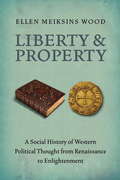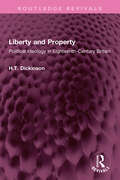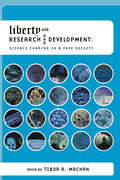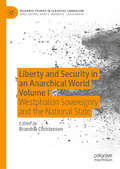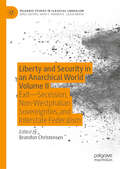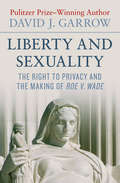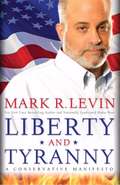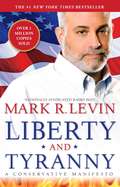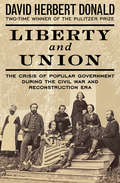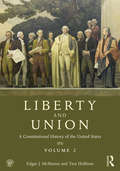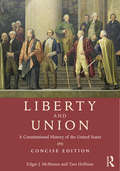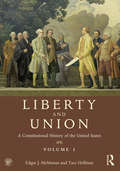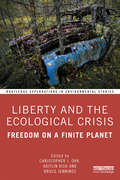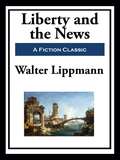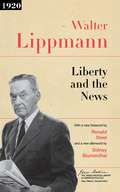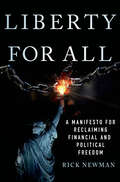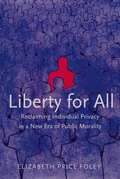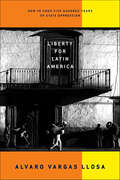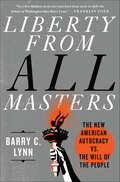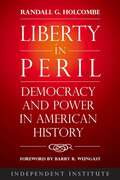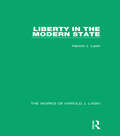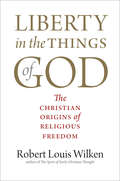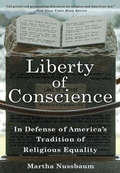- Table View
- List View
Liberty and Property
by Ellen Meiksins WoodThe formation of the modern state, the rise of capitalism, the Renaissance and Reformation, the scientific revolution and the Age of Enlightenment have all been attributed to the "early modern" period. Nearly everything about its history remains controversial, but one thing is certain: it left a rich and provocative legacy of political ideas unmatched in Western history. The concepts of liberty, equality, property, human rights and revolution born in those turbulent centuries continue to shape, and to limit, political discourse today. Assessing the work and background of figures such as Machiavelli, Luther, Calvin, Spinoza, the Levellers, Hobbes, Locke and Rousseau, Ellen Wood vividly explores the ideas of the canonical thinkers, not as philosophical abstractions but as passionately engaged responses to the social conflicts of their day.
Liberty and Property: Political Ideology in Eighteenth-Century Britain (Routledge Revivals)
by H T DickinsonFirst Published in 1977, Liberty and Property is a pioneering book which covers a long period, from 1688 to 1790 and beyond, and makes a major contribution to our understanding of eighteenth-century British politics. The relationship between political ideas and political reality is difficult to define. Consequently, historians seldom attempt to link thought and action, but concentrate solely upon the facts of a given political situation. In this book H.T. Dickinson has succeeded in redressing the imbalance. Taking as his theme the ideas and arguments used to defend or reform the constitution and political order in Britain, he combines what men wrote and said with what they actually did. His achievement is to have opened up an entirely new avenue of eighteenth-century British political history.The author bases his study on a wealth of contemporary evidence, much of it previously untouched. It includes the treatises of all major political thinkers and propagandists, all reported parliamentary debates from 1688 to 1800, literally thousands of pamphlets, sermons, magazines and newspapers, as well as an abundance of politically conscious literature by writers such as Addison, Swift, Steele, Pope and many others. This is a must read for scholars of political history, British political history and political studies.
Liberty and Research and Development: Science Funding in a Free Society
by Tibor R. MachanThe contributors to this volume explore the implications of government funding of scientific research and offer alternatives to the heavy reliance on government support that research and development (R&D) currently enjoys. Each author squarely confronts the problems arising from the idea that government funding of R&D is and ought to be the norm.
Liberty and Security in an Anarchical World Volume I: Westphalian Sovereignty and the National State (Palgrave Studies in Classical Liberalism)
by Brandon ChristensenThis book takes a hard look at libertarian foreign policy doctrines, especially those of non-intervention, interstate federalism, and non-aggression, and applies new insights to these old doctrines. Classical liberal thinkers such as Vincent Ostrom, James Madison, and F.A. Hayek have all hinted at the idea of world governance from a libertarian standpoint. Yet today, “the libertarian position” on foreign policy is either non-intervention from the US side of the Atlantic or half-hearted confederation from the European side of the Atlantic. This volume (I) hones in on the problems of Westphalian sovereignty and its nationalist shortcomings, while the other celebrates Westphalian sovereignty’s achievements in regards to keeping imperialism at bay.
Liberty and Security in an Anarchical World Volume II: Exit - Secession, Non-Westphalian Sovereignties, and Interstate Federalism (Palgrave Studies in Classical Liberalism)
by Brandon ChristensenThe book takes a hard look at libertarian foreign policy doctrines, especially those of non-intervention, interstate federalism, and non-aggression, and applies new insights to these old doctrines. Classical liberal thinkers such as Vincent Ostrom, James Madison, and F.A. Hayek have all hinted at the idea of world governance from a libertarian standpoint. Yet today, “the libertarian position” on foreign policy is either non-intervention from the US side of the Atlantic or a halfhearted confederation from the European side of the Atlantic. The themes that emerge in this volume (II) are whether or not libertarian alternatives to the status quo are workable and, if so, whatwould they look like.
Liberty and Sexuality: The Right to Privacy and the Making of Roe v. Wade
by David J. GarrowPulitzer Prize-winning author David J. Garrow's stirring and essential history of the politics of abortion and America's battle for the right to choose In 1973, the Supreme Court handed down its landmark Roe v. Wade decision legalizing abortion, and more than forty years later the issue continues to spark controversy and divisiveness. But behind this historic legal case lie the battles women fought to establish their rights to use contraceptives and choose to have an abortion. Liberty and Sexuality traces these political and legal struggles in the decades leading up to Roe v. Wade--including the momentous 1965 Supreme Court ruling in Griswold v. Connecticut that established a constitutional "right to privacy." Garrow personalizes the struggles by detailing the vital contributions made by dozens of crusaders who tirelessly paved the way. This expansive and substantial work also addresses the threats to sexual privacy and the legality of abortion that have risen since Roe v. Wade. With abortion still a contentious subject on the national political landscape, Liberty and Sexuality is not just a historical account of the right to choose, but an indispensable read about preserving a freedom that continues to divide America.
Liberty and Tyranny: A Conservative Manifesto
by Mark R. LevinConservative talk radio's fastest-growing superstar is also a New York Times bestselling phenomenon: the author of the groundbreaking critique of the Supreme Court, Men in Black, and the deeply personal dog lover's memoir Rescuing Sprite, Mark R. Levin now delivers the book that characterizes both his devotion to his more than 5 million listeners and his love of our country and the legacy of our Founding Fathers: Liberty and Tyranny is Mark R. Levin's clarion call to conservative America, a new manifesto for the conservative movement for the 21st century. In the face of the modern liberal assault on Constitution-based values, an attack that has steadily snowballed since President Roosevelt's New Deal of the 1930s and resulted in a federal government that is a massive, unaccountable conglomerate, the time for re-enforcing the intellectual and practical case for conservatism is now. Conservative beliefs in individual freedoms do in the end stand for liberty for all Americans, while liberal dictates lead to the breakdown of civilized society -- in short, tyranny. Looking back to look to the future, Levin writes "conservatism is the antidote to tyranny precisely because its principles are our founding principles." And in a series of powerful essays, Levin lays out how conservatives can counter the liberal corrosion that has filtered into every timely issue affecting our daily lives, from the economy to health care, global warming, immigration, and more -- and illustrates how change, as seen through the conservative lens, is always prudent, and always an enhancement to individual freedom. As provocative, well-reasoned, robust, and informed as his on-air commentary, Levin's narrative will galvanize readers to begin a new era in conservative thinking and action. Liberty and Tyranny provides a philosophical, historical, and practical framework for revitalizing the conservative vision and ensuring the preservation of American society.
Liberty and Tyranny: A Conservative Manifesto
by Mark R. LevinDon’t miss syndicated radio host and author Mark Levin's #1 New York Times acclaimed and longtime bestselling manifesto for the conservative movement.When nationally syndicated radio host Mark R. Levin’s Liberty and Tyranny appeared in the early months of the Obama presidency, Americans responded by making his clarion call for a new era in conservatism a #1 New York Times bestseller for an astounding twelve weeks. As provocative, well-reasoned, robust, and informed as his on-air commentary, with his love of our country and the legacy of our Founding Fathers reflected on every page, Levin’s galvanizing narrative provides a philosophical, historical, and practical framework for revitalizing the conservative vision and ensuring the preservation of American society.In the face of the modern liberal assault on Constitution-based values, an attack that has resulted in a federal government that is a massive, unaccountable conglomerate, the time for reinforcing the intellectual and practical case for conservatism is now. In a series of powerful essays, Levin lays out how conservatives can counter the tyrannical liberal corrosion that has filtered into every timely issue affecting our daily lives, from the economy to health care, global warming to immigration, and more.
Liberty and Union
by David Herbert DonaldThe two-time Pulitzer Prize winner&’s penetrating analysis of the crisis of democracy during the Civil War and Reconstruction eras. In Liberty and Union, David Herbert Donald persuasively examines one of the most tumultuous periods in American history. With the same wit, eloquence, and willingness to question received wisdom that define his acclaimed biographies of Abraham Lincoln and Charles Sumner, Donald suggests that it was the commonalities between North and South—and not their differences—that led to the earth-shattering conflict that was the Civil War and defined the chaotic years that followed. Exploring the political, social, and economic impact of the war, emancipation, Reconstruction, and westward expansion, Donald combines history and philosophy, offering a bold and thought-provoking analysis that goes far in explaining the nation we live in today. Riveting, illuminating, and provocative, Liberty and Union sheds a brilliant light on a half-century of US history and addresses a perennial problem of democratic societies all over the world: how to reconcile majority rule and minority rights.
Liberty and Union: A Constitutional History of the United States, Volume 2
by Edgar J. McManus Tara HelfmanThis, the second of two volumes of Liberty and Union, is a comprehensive constitutional history of the United States from the Progressive Era of the early twentieth century to the most recent decisions of the Supreme Court on contemporary constitutional issues. Written in a clear and engaging narrative style, it successfully unites thorough chronological coverage with a thematic approach, offering critical analysis of core constitutional history topics, set in the political, social, and economic context that made them constitutional issues in the first place. Combining a thoughtful and balanced narrative with an authoritative stance on key issues, the authors deliberately explain the past in the light of the past, without imposing upon it the standards of later generations. Authored by two experienced professors in the field, this textbook has been thoughtfully constructed to offer an accessible alternative to dense scholarly works – avoiding unnecessary technical jargon, defining legal terms and historical personalities where appropriate, and making explicit connections between constitutional themes and historical events. For students in an undergraduate or postgraduate constitutional history course, or anyone with a general interest in constitutional developments, this book will be essential reading. Useful features include: Full glossary of legal terminology Recommended reading A table of cases Extracts from primary documents Companion website Useful documents provided: Declaration of Independence Articles of Confederation Constitution of the United States of America Chronological list of Supreme Court justices
Liberty and Union: A Constitutional History of the United States, concise edition
by Edgar J. McManus Tara HelfmanThis, the concise edition of Liberty and Union, is an abridged constitutional history of the United States, designed for short single-semester courses, comprising the key topics from Volumes 1 and 2. Written in a clear and engaging narrative style, it successfully unites thorough chronological coverage with a thematic approach, offering critical analysis of core constitutional history topics, set in the political, social, and economic context that made them constitutional issues in the first place. Combining a thoughtful and balanced narrative with an authoritative stance on key issues, the authors deliberately explain the past in the light of the past, without imposing upon it the standards of later generations. Authored by two experienced professors in the field, this concise edition presents seminal topics while retaining the narrative flow of the two full original volumes. An accessible alternative to dense scholarly works, this textbook avoids unnecessary technical jargon, defines legal terms and historical personalities where appropriate, and makes explicit connections between constitutional themes and historical events. For students in a short undergraduate or postgraduate constitutional history course, or anyone with a general interest in constitutional developments, this book will be essential reading. Useful features include: Full glossary of legal terminology Recommended reading A table of cases Extracts from primary documents Companion website Useful documents provided: Declaration of Independence Articles of Confederation Constitution of the United States of America Chronological list of Supreme Court justices
Liberty and Union: A Constitutional History of the United States, volume 1
by Edgar J. McManus Tara HelfmanThis, the first of two volumes of Liberty and Union, is a comprehensive constitutional history of the United States from the Anglo-American origins of the Constitution through the colonial and antebellum periods, to the Civil War and the consequent restructuring of the nation. Written in a clear and engaging narrative style, it successfully unites thorough chronological coverage with a thematic approach, offering critical analysis of core constitutional history topics, set in the political, social, and economic context that made them constitutional issues in the first place. Combining a thoughtful and balanced narrative with an authoritative stance on key issues, the authors explain the past in the light of the past, without imposing upon it the standards of later generations. Authored by two experienced professors of History and Law this textbook has been thoughtfully constructed to offer an accessible alternative to dense scholarly works – avoiding unnecessary technical jargon, defining legal terms and historical personalities where appropriate, and making explicit connections between constitutional themes and historical events. For students in an undergraduate or postgraduate constitutional history course, or anyone with a general interest in constitutional developments, this book will be essential reading. Useful features include: Full glossary of legal terminology Recommended reading A table of cases Extensive supporting artwork Companion website Useful documents provided: Declaration of Independence Articles of Confederation Constitution of the United States of America Chronological list of Supreme Court justices
Liberty and the Ecological Crisis: Freedom on a Finite Planet (Routledge Explorations in Environmental Studies #1)
by Bruce Jennings Christopher J. Orr Kaitlin KishThis book examines the concept of liberty in relation to civilization’s ability to live within ecological limits. Freedom, in all its renditions – choice, thought, action – has become inextricably linked to our understanding of what it means to be modern citizens. And yet, it is our relatively unbounded freedom that has resulted in so much ecological devastation. Liberty has piggy-backed on transformations in human–nature relationships that characterize the Anthropocene: increasing extraction of resources, industrialization, technological development, ecological destruction, and mass production linked to global consumerism. This volume provides a deeply critical examination of the concept of liberty as it relates to environmental politics and ethics in the long view. Contributions explore this entanglement of freedom and the ecological crisis, as well as investigate alternative modernities and more ecologically benign ways of living on Earth. The overarching framework for this collection is that liberty and agency need to be rethought before these strongly held ideals of our age are forced out. On a finite planet, our choices will become limited if we hope to survive the climatic transitions set in motion by uncontrolled consumption of resources and energy over the past 150 years. This volume suggests concrete political and philosophical approaches and governance strategies for learning how to flourish in new ways within the ecological constraints of the planet. Mapping out new ways forward for long-term ecological well-being, this book is essential reading for students and scholars of ecology, environmental ethics, politics, and sociology, and for the wider audience interested in the human–Earth relationship and global sustainability.
Liberty and the News
by Walter LippmannIn Liberty and the News Walter Lippmann offers us a stern warning about the importance of reliable news to the survival of a healthy democracy. He railed against bad journalism and drove home the point that the general public must be able to ascertain the truth or democracy is doomed. Walter Lippmann was a Pulitzer Prize–winning journalist and the father of modern journalism.
Liberty and the News (The James Madison Library in American Politics)
by Walter LippmannLiberty and the News is Walter Lippman's classic account of how the press threatens democracy whenever it has an agenda other than the free flow of ideas. Arguing that there is a necessary connection between liberty and truth, Lippman excoriates the press, claiming that it exists primarily for its own purposes and agendas and only incidentally to promote the honest interplay of facts and ideas. In response, Lippman sought to imagine a better way of cultivating the news. A brilliant essay on a persistent problem of American democracy, Liberty and the News is still powerfully relevant despite the development of countless news sources unimagined when Lippman first published it in 1920. The problems he identifies--the self-importance of the press, the corrosion of rumors and innuendo, and the spinning of the news by political powers--are still with us, and they still threaten liberty. By focusing on the direct and necessary connection between liberty and truth, Lippmann's work helps to clarify one of the most pressing predicaments of American democracy today.
Liberty for All: A Manifesto for Reclaiming Financial and Political Freedom
by Rick NewmanAmericans are increasingly dismayed with a broken political system and the big institutions they blame for a Darwinian economy (in which it's getting harder to get ahead). What they've lost sight of is the importance of self-reliance and personal initiative in every individual's quest for prosperity. Liberty For All pushes past the usual go-nowhere policy prescriptions to probe what ordinary people can do to build their own self-reliance and enhance their odds of success. In a wry and entertaining narrative, Rick Newman embarks on a quest to improve his own self-reliance by camping with "doomsday preppers," deconstructing the "rugged individualist" that politicians so often invoke, and detailing the ways we unnecessarily shackle ourselves. The result is a guide to enriching your prospects—and your life—by harnessing every freedom available.
Liberty for All: Reclaiming Individual Privacy in a New Era of Public Morality
by Elizabeth Price FoleyIn the opening chapter of this book, Elizabeth Price Foley writes, "The slow, steady, and silent subversion of the Constitution has been a revolution that Americans appear to have slept through, unaware that the blessings of liberty bestowed upon them by the founding generation were being eroded." She proceeds to explain how, by abandoning the founding principles of limited government and individual liberty, we have become entangled in a labyrinth of laws that regulate virtually every aspect of behavior and limit what we can say, read, see, consume, and do. Foley contends that the United States has become a nation of too many laws where citizens retain precious few pockets of individual liberty. With a close analysis of urgent constitutional questions--abortion, physician-assisted suicide, medical marijuana, gay marriage, cloning, and U. S. drug policy--Foley shows how current constitutional interpretation has gone astray. Without the bias of any particular political agenda, she argues convincingly that we need to return to original conceptions of the Constitution and restore personal freedoms that have gradually diminished over time.
Liberty for Latin America: How to Undo Five Hundred Years of State Oppression
by Alvaro Vargas LlosaLatin America's Foremost Political Journalist Makes a Brilliant and Passionate Argument for Real Reform In the Economically Crippled ContinentIn Liberty for Latin America, Alvaro Vargas Llosa offers an incisive diagnosis of Latin America's woes--and a prescription for finally getting the region on the road to both genuine prosperity and the protection of human rights. When the economy in Argentina--at one time a model of free-market reform--collapsed in 2002, experts of all persuasions asked: What went wrong? Vargas Llosa shows that what went wrong in Argentina has in fact gone wrong all over the continent for over five hundred years. He explains how the republics of the nineteenth century and the revolutions of the twentieth-populist uprisings, Marxist coops, state takeovers, and First World-sponsored privatization-have all run up against the oligarchic legacy of statism. Illiberal elites backed by the United States and Europe have perpetuated what he calls the "five principles of oppression" in order to maintain their hold on power. The region has become "a laboratory for political and economic suicide," while comparable countries in Asia and Eastern Europe have prospered. The only way to change things in Latin America, Vargas Llosa argues, is to remove the five principles of oppression, genuinely reforming institutions and the underlying culture for the benefit of the disempowered public. In Liberty for Latin America, he explains how, offering hope as well as insight for all those who care for the future of this troubled region.
Liberty from All Masters: The New American Autocracy vs. the Will of the People
by Barry C. LynnBarry C. Lynn, one of America's preeminent thinkers, provides the clearest statement yet on the nature and magnitude of the political and economic dangers posed by America’s new monopolies in Liberty from All Masters."Very few thinkers in recent years have done more to shift the debate in Washington than Barry Lynn."—Franklin Foer Americans are obsessed with liberty, mad about liberty. On any day, we can tune into arguments about how much liberty we need to buy a gun or get an abortion, to marry who we want or adopt the gender we feel. We argue endlessly about liberty from regulation and observation by the state, and proudly rebel against the tyranny of course syllabi and Pandora playlists. Redesign the penny today and the motto would read “You ain’t the boss of me.”Yet Americans are only now awakening to what is perhaps the gravest domestic threat to our liberties in a century—in the form of an extreme and fast-growing concentration of economic power. Monopolists today control almost every corner of the American economy. The result is not only lower wages and higher prices, hence a concentration of wealth and power in the hands of the few. The result is also a stripping away of our liberty to work how and where we want, to launch and grow the businesses we want, to create the communities and families and lives we want. The rise of online monopolists such as Google and Amazon—designed to gather our most intimate secrets and use them to manipulate our personal and group actions—is making the problem only far worse fast. Not only have these giant corporations captured the ability to manage how we share news and ideas with one another, they increasingly enjoy the power to shape how we move and play and speak and think.
Liberty in America, 1600 to the Present (Liberty in America, Volume #1)
by Oscar Handlin Lilian HandlinThis volume discusses the concept of liberty, what it meant in 1600, and what the concept developed into, up to the eve of the Revolution.
Liberty in Expansion: 1760-1850 (Liberty in America, Volume #2)
by Oscar Handlin Lilian HandlinVolume 2 of Liberty in America-- 1600 to the Present.
Liberty in Peril: Democracy and Power in American History
by Randall G. HolcombeWhen the United States was born in the revolutionary acts of 1776, Americans viewed the role of government as the protector of their individual rights. Thus, the fundamental principle underlying the new American government was liberty. Over time, the ideology of political &“democracy&”—the idea that the role of government is to carry out the &“will of the people,&” as revealed through majority rule—has displaced the ethics of liberty. This displacement has eroded individual rights systematically and that history is examined in Liberty in Peril by Randall Holcombe in language accessible to anyone.The Founders intended to design a government that would preclude tyranny and protect those individual rights, and the Bill of Rights was a clear statement of those rights. They well understood that the most serious threat to human rights and liberty is government. So, the Constitution clearly outlined a limited scope for government and set forth a form of governance that would preserve individual rights. The federal government&’s activities during two world wars and the Great Depression greatly increased government&’s involvement in people&’s lives. By the time of Lyndon Johnson&’s &“Great Society,&” the depletion of rights and the growth of the activities of political democracy was complete. By the end of the 20th Century the fundamental principle underlying the U.S. government was now political power and not liberty. Public policy was oriented toward fulfilling the majority rule with the subsequent increase in government power and scope. Holcombe argues that economic and political systems are not separate entities but are intimately intertwined. The result is a set of tensions between democracy, liberty, a market economy, and the institutions of a free society. All those interested in the evolution of American government, including historians, political scientists, economists, and legal experts, will find this book compelling and informative.
Liberty in the Modern State (The Works of Harold J. Laski)
by Harold J. LaskiUpdated to take into account the post-war political landscape, this book, consisting of some undelivered lectures originally dating from 1929, discusses the meaning and place of liberty and freedom in a global post-war context.
Liberty in the Things of God: The Christian Origins of Religious Freedom
by Robert Louis WilkenFrom one of the leading historians of Christianity comes this sweeping reassessment of religious freedom, from the church fathers to John Locke In the ancient world Christian apologists wrote in defense of their right to practice their faith in the cities of the Roman Empire. They argued that religious faith is an inward disposition of the mind and heart and cannot be coerced by external force, laying a foundation on which later generations would build. Chronicling the history of the struggle for religious freedom from the early Christian movement through the seventeenth century, Robert Louis Wilken shows that the origins of religious freedom and liberty of conscience are religious, not political, in origin. They took form before the Enlightenment through the labors of men and women of faith who believed there could be no justice in society without liberty in the things of God. This provocative book, drawing on writings from the early Church as well as the sixteenth and seventeenth centuries, reminds us of how “the meditations of the past were fitted to affairs of a later day.”
Liberty of Conscienc: In Defense of America's Tradition of Religious Equality
by Martha NussbaumThe respect for religious difference has formed the bedrock of our nation and made equality possible. Yet today we are told that "moral values”--code for a government shaped by religious concerns--must be the keystone of our social compact. A rich and compelling chronicle of an essential idea, Liberty of Conscience tells the story of America’s great tradition of religious freedom. Philosopher Martha Nussbaum’s ambitious book is both a work of history and a pointed rejoinder to conservative efforts to break down barriers between church and state.
